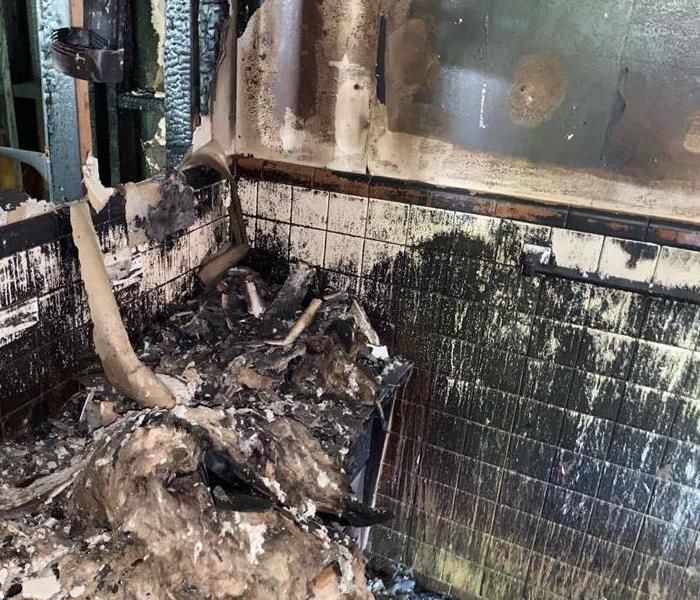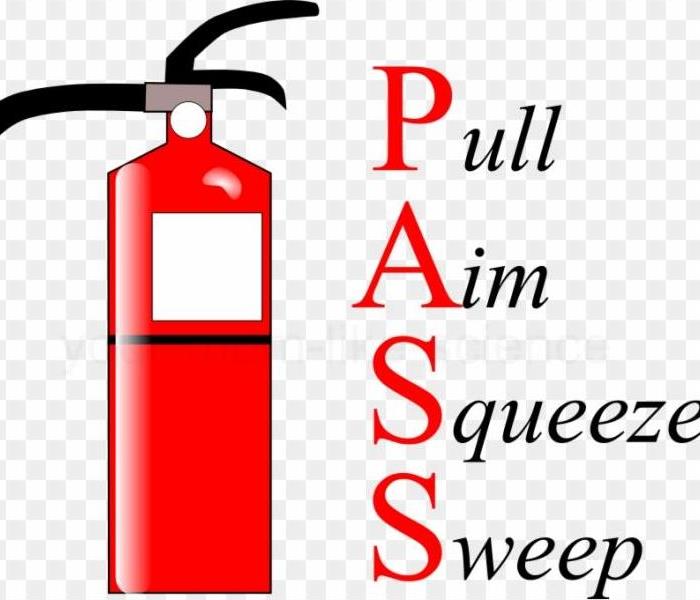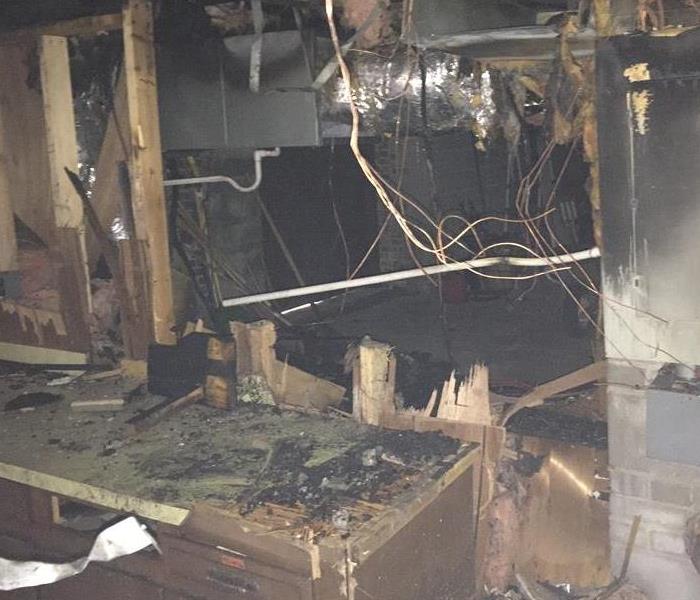Recent Fire Damage Posts
Orangeburg Municipal Airport
1/23/2023 (Permalink)
Dealing with fire damages are stressful and scary. There are two things I recommend doing when dealing with a situation like this. First call 911. Next , call SERVPRO of Orangeburg. That is just what Orangeburg Municipal Airport did. The ice maker in there break room caused a fire. This was an electrical fire , which is a class C fire. This fire spread to the office next door into the office. So our professional team of production technicians loaded there trucks and started the job. We had to do demolition inside the break room and office. We took the ceilings, floors and walls out. There was some contents affected. So we took them outside and cleaned them. Also we took the cabinets and counter outside to be cleaned. Once everything was cleared out we sealed for odor and we ozone and fogged the affected areas. We then put all contents back that was salvageable . All debris was taken back to our facility to dump. Over all the customer was so impressed and satisfied with out service.
Always remember to call SERVPRO of Orangeburg for your fire damage needs 803.536.1285
Electrical Fire
1/20/2023 (Permalink)
I know you are all wondering how electrical fires are started well here are some ways they are stared and how you can prevent them from happening. Most electrical fires are caused by faulty electrical outlets and old, outdated appliances. Other fires are started by faults in appliance cords, receptacles and switches.
Causes of an electrical fire :
- Common electrical outlets
- Outdated or warn out electrical wiring
- Cord overloads
- Old appliances
- Light fixtures
- Portable heaters
How to prevent electrical fires from occurring :
- Repair or replace loose outlets as soon as you notice them.
- Call a professional to do a thorough electrical safety audit of your wiring, external power panels, and electrical wall outlets.
- Call a professional who follows the National Electrical Code to inspect your house to replace or repair the electrical wiring.
- Call your security system company to replace, repair or install your smoke detectors.
- Pay close attention to your appliances , if they are making a strange noise or if the wiring is hot you need to have it replaced or repair quickly.
- Avoid using extension cords for light fixtures and never decorate a light with paper or plastic.
- When using a portable heaters have it in a open space and plug it into a wall socket and not a extension cord.
Make sure you always call 911 first then give SERVPRO of Orangeburg a call 803.536.1285
Types of Fires and How to Put Them Out
3/2/2022 (Permalink)
Did you know there are at least five different types of fires? Each fire class requires specific methods to extinguish. Keep your home or business safe by keeping on hand the right types of equipment that are designed to put out specific types of fires.
Below is a quick run down of the types of fires and the ways to put them out;
- Class A Fires - Extinguish with water
- Ignites from common fuel sources, like wood, trash, fabrics, paper, and plastics
- Accidental
- Class B Fires - Extinguish by depleting oxygen
- Result from an explosion of flammable liquids or gases
- Flammable liquids: paint, tars, alcohol, oils, solvents, gasoline, and kerosene.
- Flammable gases: butane and propane
- Class C Fires - Extinguish by cutting power
- Electrical fires
- Common causes: space heaters, faulty wiring, outdated appliances and lights, transformers, motors, and overburdened surge protectors
- Class D Fires - Extinguish with dry powder agents
- Sparked by combustible metals
- Combustible metals: titanium, magnesium, sodium, lithium, aluminum, and potassium
- Class K Fires - Extinguish with chemical fire extinguisher
- Cooking fires, Grease fires
- Sparks from grease, lard, olive oil, butter, animal fats, and vegetable fats
Tips to Avoid Electrical Fires
3/1/2022 (Permalink)
Electrical fires originate in electric wires, cables, circuit breakers, or within electrical components and can cause twice the monetary damage as non-electrical fires, According to the U.S. Fire Administration (USFA.)
Common causes of electrical fires and ways to prevent them include:
- Poor Maintenance - performing regular maintenance on electrical panels will help reduce the risk of electrical fires.
- Old Equipment and Appliances - replacing outdated and faulty circuits within equipment and appliances helps reduce the risk of electrical fires.
- Not Following Safety Codes - make sure wiring matches the circuit amperage requirements and is free of any imperfections to help prevent electrical fires.
Don’t forget that working smoke detectors save lives. When these devices are present and properly maintained, they give you and yours precious time to react and escape in the event of a fire.
We hope these tips are helpful, and you never have to worry about mitigating after a fire, however if you find yourself in the midst of this, contact SERVPRO of Orangeburg. We will make it "Like it never even happened."
(803)536-1285
SERVPRO Tips!
1/31/2022 (Permalink)
Every 18 seconds a fire occurs in the United States, SERVPRO understands the trauma of fire disasters. Here are some helpful fire and smoke damage tips;
Do's
- Limit movement in the structure to prevent soot particles from being embedded into upholstery and carpets
- Keep hands clean, soot on hands can further soil upholstery, walls, and woodwork
- Place dry, colorfast towels on rugs, upholstery and carpet traffic areas
- If electricity is off, empty freezer and refrigerator completely, and prop doors open to help prevent odors
- Wipe soot from chrome on kitchen and bathroom faucets, trim and appliances. Then protect with a light coating of lubricant
- Pour RV antifreeze into sinks, toilet bowls, holding tanks and tubs if heat is off during freezing season
- Change HVAC filter, but leave system off until checked by trained professional
Don'ts
- Attempt to wash an walls or painted surfaces without first contacting your SERVPRO Franchise Professional
- Attempt to shampoo carpet or upholstered furniture without first consulting your local SERVPRO
- Consume any canned or packaged food or beverages that may have been stored close to fire, heat, or water. (They may be contaminated.)
- Turn on ceiling fixtures if ceiling is wet, wiring may be wet or damaged and cause electrical shock.
Contents Restoration Services
1/24/2022 (Permalink)
Fires can be very damaging to your home or business. Those affected by something so traumatizing as a fire damage can lose some if not the majority of their precious belongings. In some worse case scenarios, victims of a fire loss can be left without a home completely. SERVPRO Professionals understand how devastating this is for a customer to go through. Your personal belongings can be very sentimental and invaluable, which is why we, at SERVPRO, strive to restore all salvageable contents to preloss condition. Although, unfortunately, we are not always able to salvage everything, we strive to help our wonderful community and to restore as much of their sentimental and valuable belongings as possible.
When there is a loss in any of our communities, we empathize and strive to offer excellent and thoughtful services to those in need. We are here to begin the restoration process at the customers earliest convenience. You are not alone, we are here to help. Contact your local SERVPRO Franchise or call 1-800-SERVPRO.
Fire and smoke damage.
5/10/2021 (Permalink)
Fire and smoke damage can cause major damage to your personal property and structures. Reacting quickly can help you minimize the impact of the damage. You should consider hiring a professional to help you manage the damage in the correct manner. If left untreated, smoke and fire damage can be more devastating than the fire in many ways, including:
Cost increases
When smoke damage goes untreated for a long period, the odors become more persistent and more difficult to neutralize. This can make the treatment process more time consuming and ultimately more expensive.
Soot deposits
Neutralizing residual soot and deposits is an effective first step. If left, soot can easily travel into other rooms that weren't affected by the fire, staining the paint, carpet, furniture, drapes, clothing and any other household items.
Corrosive damage
Smoke and ash can mix with water to produce a very corrosive element. If not cleaned quickly, this corrosive substance begins to slowly eat away walls, floors, ceilings and other surfaces in your home. Just cleaning with soap and water isn't enough. This substance requires the appropriate chemicals to completely remove it and lessen the damages.
If you have smoke damage in your home or business; contact SERVPRO of Orangeburg today. (803)536-1285. We will make it "Like it never even happened."
Smoke and fire damage clean up
5/3/2021 (Permalink)
 Extensive fire damage in a local home
Extensive fire damage in a local home
Here at SERVPRO of Orangeburg, we mitigate many disasters that could happen to your home. This includes fires.
Fires present unique challenges because while trying to extinguish the fire, water damage is also caused. We are, however, prepared for this. With our wide array of cleaning solutions and machines we are capable of making it look "Like it never even happened."
An example of some of the chemicals we have on hand are Wall and All Plus and Wall rinse. These are used consecutively to ensure the best clean.
Wall and All Plus is used to clean smoke damage on any painted and washable surface. This formula utilizes a surfactant boosting system that does not raise the PH, provides less foam, streaking, and residue for a superior clean.
Then we follow with Wall Rinse, which is a neutralizing and deodorizing agent used to rinse walls after cleaning with alkaline based products like Wall and All Plus.
We hope you never need us for a fire, but if you do we are here to help 24/7/365. Just give us a call. (803)536-1285.
Fire Restoration
3/8/2021 (Permalink)
In the unfortunate event that you are impacted by a house fire; we here at SERVPRO of Orangeburg are dedicated to providing you with 24-hour emergency service, 365 days a year.
We offer:
- PRETESTING - We start the fire cleanup and restoration process by pretesting to determine which processes to utilize and we allow you to preview the results.
- CONTENTS CLAIM INVENTORY SERVICE (CCIS) - We can generate comprehensive room-by-room inventories. Contents will be categorized as salvageable, non-salvageable, and questionable. This allows for easier contents settlement.
- CLEANING AND RESTORATION - All restorable structure and contents will be professionally cleaned and deodorized to preloss condition in most cases. This includes: walls, ceilings, floors, rugs, furniture, electronics, art, clothing, knick- knacks and more. We even provide emergency cleaning of items you will need immediately.
- MOVE OUTS - If relocation is necessary due to extensive damage, we are also trained to properly move out and control the inventory of contents throughout the cleaning and restoration process.
Remember SERVPRO of Orangeburg's Franchise Professionals are trained to make it "Like it never even happened." (803)536-1285.
Types of Fire Extinguishers and Their Uses
2/5/2021 (Permalink)
 This is a fire extinguisher and an acronym to help remember how to use it.
This is a fire extinguisher and an acronym to help remember how to use it.
Fire extinguishers are vital in putting out fires and lessening the damage that could be caused. There are 6 main types of fire extinguishers, which will be reviewed here as well as their best uses.
- ABC Fire Extinguisher – This is the most common extinguisher. It sprays a fine chemical mist that acts as a blanket to suffocate the fire. The ABC extinguisher can stop the reaction of liquid or gas fires.
- Carbon Dioxide Extinguisher – This is the cleanest extinguisher because it leaves no residue and requires no clean up. It works by removing the oxygen to the fire which in turn suffocates it.
- Wet Chemical Fire Extinguisher – This is best for fires involving animal or vegetable fats and oils. It has a solution that attacks fires in two ways.
-First: A liquid mist acts to cool the fire.
- Second: A thick soap like substance forms, due to a chemical reaction with the cooking medium, that seals the liquid and prevents reignition.
- Water Mist Fire Extinguisher – This is the most versatile of the fire extinguishers because it works across most classes of fire. This is possible because the fire is fought on multiple layers.
_ Water is dispensed in a fog like form, decreasing the oxygen.
_ The water works to cool the temperature of the fire.
_ The water has been de-ionized, thus allowing to be used on electrical fires because it will not act as a conductor.
- Foam Fire Extinguisher – This sprays a foam that expands when it hits the air which will blanket the fire. This “blanket” starves the fire out of fuel by preventing the vapors from rising. Foam extinguishers are best used on flammable liquids like gas fires.
- Clean Agent Fire Extinguisher – This style is stored in a liquid form when it hits the air it converts to gas, which is non-conductive, leaves no residue, and is eco-friendly. The clean agent extinguisher is best used for fires on electrical or computer equipment.
Call SERVPRO of Orangeburg for any of you fire mitigation needs. (803)536-1285.
Preventing and Putting Out Grease Fires
1/27/2021 (Permalink)
Tips to Prevent a Grease Fire:
Never leave your pot or pan unattended. It takes less than 30 seconds for smoke to turn into firePay attention around fire. Don’t cook when intoxicated or tired.Remove as much moisture as possible from food before cooking. Never put frozen food into hot grease.Keep grease at the recommended temperature.Heat oil slowly.Add food slowly and gently to hot oil to avoid splatter.What to Do In Case of Grease Fire:
Turn off the burner.Remove the oxygen by either covering the pot/pan with a metal lid, smothering with baking soda or salt, or lastly, by using a fire extinguisher (this is the best method, if you have one available.)If these steps don't work, call 911 and get everyone out of the house. Close the door behind you to help contain the flames.What Not to Do In a Grease Fire:
Never try to put out a grease fire with any liquid. It will vaporize and cause steam explosions.Never carry the burning pot/pan outside. You are likely to spill the grease and spread the fire.Do not use anything glass or plastic to try to put out the fire. Glass will heat up and shatter and plastic will melt.Never use baking powder or flour as substitutes for salt or baking soda. They are combustible, and will spread the fire.If you are ever faced with a fire, Call SERVPRO of Orangeburg 24/7 365. (803)536-1285.
Tips to Prevent Electrical Fires
1/20/2021 (Permalink)
 Aftermath Of An Electrical Fire
Aftermath Of An Electrical Fire
Electrical fires originate in electric wires, cables, circuit breakers, or within electrical components and can cause twice the monetary damage as non-electrical fires, According to the U.S. Fire Administration (USFA.)
Common causes of electrical fires and ways to prevent them include:
- Poor Maintenance - performing regular maintenance on electrical panels will help reduce the risk of electrical fires.
- Old Equipment and Appliances - replacing outdated and faulty circuits within equipment and appliances helps reduce the risk of electrical fires.
- Not Following Safety Codes - make sure wiring matches the circuit amperage requirements and is free of any imperfections to help prevent electrical fires.
Don’t forget that working smoke detectors save lives. When these devices are present and properly maintained, they give you and yours precious time to react and escape in the event of a fire.
We hope these tips are helpful, and you never have to worry about mitigating after a fire, however if you find yourself in the midst of this, contact SERVPRO of Orangeburg. We will make it "Like it never even happened."
(803)536-1285
Orangeburg Smoke and Soot Cleanup
12/11/2020 (Permalink)
Smoke and soot is very invasive and can penetrate various cavities within your home, causing hidden damage and odor. Our smoke damage expertise and experience allows us to inspect and accurately assess the extent of the damage to develop a comprehensive plan of action.
Smoke and soot facts:
- Hot smoke migrates to cooler areas and upper levels of a structure.
- Smoke flows around plumbing systems, seeping through the holes used by pipes to go from floor to floor.
- The type of smoke may greatly affect the restoration process.
Different Types of Smoke
There are two different types of smoke–wet and dry. As a result, there are different types of soot residue after a fire. Before restoration begins, SERVPRO of Orangeburg will test the soot to determine which type of smoke damage occurred. The cleaning procedures will then be based on the information identified during pretesting. Here is some additional information:
Wet Smoke – Plastic and Rubber
- Low heat, smoldering, pungent odor, sticky, smeary. Smoke webs are more difficult to clean.
Dry Smoke – Paper and Wood
- Fast burning, high temperatures, heat rises therefore smoke rises.
Protein Fire Residue – Produced by evaporation of material rather than from a fire
- Virtually invisible, discolors paints and varnishes, extreme pungent odor.
Our Fire Damage Restoration Services
Since each smoke and fire damage situation is a little different, each one requires a unique solution tailored for the specific conditions. We have the equipment, expertise, and experience to restore your fire and smoke damage. We will also treat your family with empathy and respect and your property with care.
Have Questions about Fire, Smoke, or Soot Damage?
Call Us Today – (803)536-1285




 24/7 Emergency Service
24/7 Emergency Service


